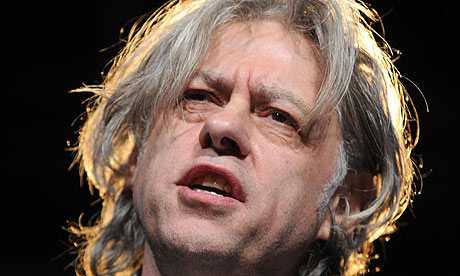BBC admits it was wrong to have given ‘impression’ that money from charity song ended up being spent on weapons

Not many people come away from a clash with Bob Geldof unscathed. And for the BBC it has proved no different. Today, across BBC1, Radio 4 and the World Service, it will broadcast an apology to the singer-philanthropist and the Band Aid Trust he founded.
Accused by Geldof of causing “appalling damage” to the famine relief charity he founded in 1985, the BBC will admit that it was wrong, in a story broadcast in March this year, to have given the “impression” that money raised from the Band Aid single Do They Know It’s Christmas ended up being spent on weapons rather than charity. It is a climbdown that Geldof said would “begin to repair some of the appalling damage done” to the reputation of Band Aid, and he welcomed it “on behalf of all those members of the public who have so magnificently donated to Band Aid and Live Aid over the last 26 years”.
Once, the BBC’s relationship with Geldof was very different. It was dispatches by BBC reporter Michael Buerk from famine-hit Ethiopia that prompted Geldof to record the song in the first place, and it was the corporation that broadcast the Live Aid concert in 1985.
But goodwill evaporated this year when the World Service’s Africa editor, Martin Plaut, broadcast a story featuring a former Ethiopian rebel commander who claimed that in 1985 only 5% of the $100m destined for famine relief in the northern province of Tigray reached the starving.
The BBC now admits that Assignment programme failed to clearly distinguish that in fact no Band Aid cash was diverted for arms sales – an embarrassing admission that Geldof said was a “lapse in standards” by the corporation.
An inquiry by the BBC’s editorial complaints unit stressed that Assignment “did not make the allegation that relief aid provided by Band Aid was diverted” but conceded that “this impression could have been taken from the programme” because viewers would have assumed that claims made by the former rebel applied to the money he helped raise.
The programme also carried an allegation from another former rebel that the Tigrayan People’s Liberation Front had tricked aid workers into giving them money meant to buy food for the starving. The story was picked up by BBC news bulletins, including the Six O’Clock News.
The BBC said it “should have been more explicit in making it clear that the [Tigrayan] allegations did not relate specifically to Band Aid. There will be on air apologies and corrections and we are looking at the lessons that can be learnt.”
Today Sir Brian Barder, the British ambassador to Ethiopia between 1982 and 1986, said: “I welcome the BBC’s far-reaching apology to the Band Aid Trust for the seriously unfair and misleading impression given by the BBC World Service Assignment programme about alleged diversion of famine relief aid in limited rebel-held areas of the Ethiopian province of Tigray in the 1980s.
“The apology makes it absolutely clear that none of these allegations applied to the Band Aid relief effort.”
The publicity will be a blow to the BBC, just a day after world affairs editor John Simpson compared last month’s hastily negotiated licence fee settlement with “waterboarding”, arguing it leaves the corporation “at the government’s mercy”. To add to the corporation’s woes it is also facing a 48-hour strike from Friday by BBC journalists over pension changes.
The Guardian

Leave a Reply